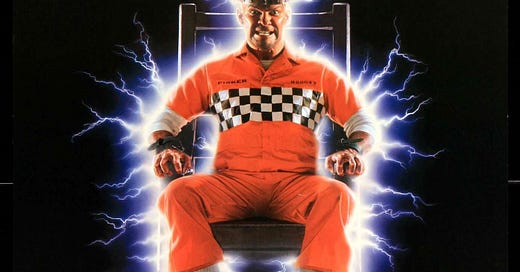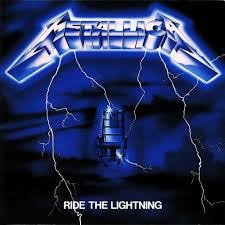Heavy on the Horror, Vol. XI
Pairing up and celebrating heavy metal and horror. Classic, new, and all points in between.
Horror films are the heavy metal albums of cinema. Heavy metal albums are the horror films of music.
Instead of food and wine, HEAVY ON THE HORROR pairs heavy metal albums with horror films to celebrate both.
M E N U
HEAVY: Ride the Lightning, Metallica, 1984
-with-
HORROR: Shocker, Wes Craven, 1989
Eventually I had to get around to Metallica.
Thus far I’ve looked at Black Sabbath (both the Ozzy and Dio iterations), Maiden, and Slayer, plus Queensryche, White Zombie, Meshuggah, and Sleep. Eventually the San Francisco Bay Area’s thrash metal titans were going to shoulder their way into this little newsletter. Just as Sabbath is inextricable from the canvas of metal, so too is Metallica, a group with such a long and deep shadow that scarcely any heavy band – at least in America – formed since 1981 doesn’t owe them at least a nod. At times derided for their individual musicianship1 yet capable of a ferocious blend of speed and power collectively, Metallica has been a force in hard rock for generations now.
I was certainly aware of them before I really knew them. A ne’er-do-well friend who had dropped out of school and enlisted in the Navy returned one summer with a stack of their cassettes up to 1988’s …And Justice For All. A co-inhabitant of my freshman year dormitory used to play that album’s “One” every afternoon like clockwork after his chemistry class. A few years later the Metallica album was omnipresent, and the snarling subliminal video for “Enter Sandman” sank an immediate hook. I didn’t know the name Cliff Burton (or really, Dave Mustaine, for that matter), but even then I sensed a shift in their career, an outcry from the purists that had followed the band from their deepest underground years, railing against “selling out.” The album, of course, was absolutely huge. Further on through the 90s, Load and the tracks “Hero of the Day” and “King Nothing” rocked, but the band’s flirtation with aspects of glam didn’t sit well in all corners. The Napster controversy2 and intraband strife followed. But I didn’t really get Metallica until I saw them in the August 2000 as a makeup for their aborted Atlanta appearance earlier that summer3, and then, yeah, I completely got it. My subjective memory of that show is the in-your-face intensity, and as Metallica left the stage I thought, what, they’re only gonna play thirty minutes?!? only to look at my watch and realize two hours had rocketed by.
A more grizzled, slightly paunchier Metallica still can bring the fastball for sure, but in 1984 and their sophomore album Ride the Lightning, they were capable of straight-up peeling paint, showcased with the lacerating heat of “Fight Fire With Fire” and the title track, a study of wrongful accusation that’s so giddily nightmarish in its high concept – waking up strapped into an electric chair, switch about to be thrown, no idea how or why you’re there – that its maddened ambition rivals anything in metal up to and including the pulp SF art of Sabbath’s “Iron Man.”
Maddened. Speaking of electric chairs, maddened is how I’ll describe Wes Craven’s Shocker. Not just completely unhinged at times, also quite angry, as Craven mercilessly cross-examines his most famous creation at that time.4
Craven’s original intent was for the story of Freddy Krueger to end at one chapter, with Nancy and her friends imprisoned and riding away to an uncertain fate. But New Line Cinema, recognizing it had a winner on its hands5, pushed for a series. Although he helped write the script for the third chapter, Dream Warriors, Craven stayed mostly away from the franchise for a decade until 1994’s New Nightmare, the meta-sequel that proved a direct stepping stone to Scream two years later.
But it’s clear Freddy is on Craven’s mind from the opening moments of Shocker, which like Nightmare feature an unknown person creating something, tinkering with sparking electric components, soldering some inscrutable creation. As with the introduction of Freddy, we don’t know who this is. Unlike Freddy’s debut, which shows us clearly what’s underway, we’re so unsure of what’s going on that it feels like parody without any real intent except for parody, a snarky sort of cover version of an earlier, more successful song.
Peter Berg, who would go on to direct the quite-good-really film of Friday Night Lights and the not as good but still effective adaptation of Lone Survivor, gives a weird and uneven performance as Jonathan Parker, gifted but somewhat goofy and accident-prone college football star, foster child of the eternally grouchy Lieutenant Don Parker (Michael Murphy), who’s always either shouting at the incompetence around him, reaching for a cigarette, or sometimes both. Chiefly known for his recurring role as FBI Deputy Director Skinner on TV’s The X-Files, Mitch Pileggi is this movie’s Freddy Krueger – Horace Pinker, whom we’re told is “savagely powerful” and “highly intelligent,” and who conducts off-camera Satanic worship and animal sacrifice, but we mostly see as a sweaty, sneering wild-eyed sadist wielding an ordinary knife. The collision course of Pinker and the Parkers is given such a chaotic, nearly logic-free portrayal that we seem meant to perceive a dreamlike quality to the proceedings and wonder what is actually happening within the framework of the film. As a work of narrative filmmaking, Shocker threatens to slip the tether repeatedly over its runtime, finally going full-tilt in the homestretch as Jonathan and Pinker crash through television screens to do battle across a melange of broadcasts from Leave It To Beaver to news coverage of a riot to a music video, devolving into a deranged fantasy of body-swapping and satire of mass-market consumerism. Somewhere in there, Megadeth — featuring, of course, exiled Metallica guitarist Mustaine6 — covers Alice Cooper’s “No More Mister Nice Guy.” It’s as crazy as it sounds.
But where Freddy is nasty and scary and creepy and weird thanks to his odd attire, strange weaponry, and hideous scarring, Pinker is mostly just a leering savage, a killer yes, but hardly more than you’d find on a weekly episode of a network TV procedural like CSI. His plain clothes and unimaginative weaponry render him a faint shade of Freddy, whose mystery is powerful - for most of his debut, we’re piecing together who he is, where he comes from, and what drives him, and the enigma amplifies the terror7. Post-execution, Pinker’s possessive spirit features graphic burn scars courtesy of the electric chair, but even that feels like a hat tip to the more expressive and memorable creation. There’s so much here that seems like deconstruction of a more fully considered and original cinematic vision, and the inner logic is so spotty it all has a made-up-on-the-fly feel. At a minimum, it feels like Shocker needed another turn or two through the scriptwriting process, although the film went through multiple cuts to obtain an ‘R’ rating and there’s no telling what that excised footage might’ve added.
But I didn’t come here to bag on Shocker. For aficionados it’s a messy but interesting document of the middle ground between Freddy Krueger and Ghostface, and Craven still takes advantage of the opportunity to showcase his unique ability to mix impressive cinematic expression with grindhouse grime. Ultimately, though it’s acquired a small but devoted fanbase attracted to its mixture of horror and comedy, it’s too uneven to wind up as ]much more than a footnote in an influential career.
Ride the Lightning, on the other hand, is no footnote. Though it would be outshined by Master of Puppets a couple of years later and wildly outsold by the Black Album at the start of the 1990s, there’s an argument to be made that it stands as the purest distillation of Metallica’s high-voltage power8. Culminating in the nearly nine minutes of eldritch instrumental “The Call of Ktulu,” the record races through eight tracks in less than fifty minutes, establishing many of the trademarks the band still works today, within songs that remain mainstays of the Metallica live setlist forty-plus years into their career9. Electrifying. Shocker doesn’t pack the same power, but it’s still got juice.
Ride the Lightning (1984) Metallica. Music and Lyrics by James Hetfield, Lars Ulrich, Kirk Hammett, Cliff Burton, and Dave Mustaine. Produced by Metallica, Flemming Rasmussen, and Mark Whitaker. 8 tracks / 47 minutes, 26 seconds.
Shocker (1989) Written and directed by Wes Craven. Produced by Bob Engelman, Peter Foster, Barin Kumar, and Marianne Maddalena. Starring Michael Murphy, Peter Berg, Cami Cooper, and Mitch Pileggi. Distributed by Universal Pictures.. 1 hour, 50 minutes.
UP NEXT: Let’s get dirty with Alice…and the creators of Alien!
Many ‘real’ drummers hate Lars Ulrich, and the band is self-deprecating here too. James Hetfield has said he feels the members of Metallica are all, individually, merely average musicians. It’s what they can do together that matters.
Re-litigating the past is boring for me and my take on the Napster business — inasmuch as I can be bothered to have one — boils down to: Metallica wasn’t wrong, but their response was not well-executed.
Metallica were the scheduled headliners at the “Summer Sanitarium” tour in 2000, appearing with System of a Down, Korn, Kid Rock, and others, but bowed out of their Atlanta appearance late due to James Hetfield’s back injury. To make up for it, they played two amphitheater shows later that summer open to all Summer Sanitarium ticket holders, a brilliant move that a more cynical band would’ve skipped.
Scream’s Ghostface has arguably taken that crown from Freddy Krueger by this stage.
New Line Cinema, which went on to release such successful works as Blade, Rush Hour, and the Lord of the Rings films, has been referred to as “the house that Freddy built.”
Although their commercial achievements pale in comparison to Metallica’s, Megadeth is still a highly successful band by almost any metric. I’m only pointing out the presence of Mustaine as an interesting link. Probably coincidental, but still interesting.
This is before later films in the Nightmare series played up more of Freddy’s comedic aspects and even had him making jokes—often at his victims’ expense, but still adding a humorous angle that Craven notably disliked.
I used to claim it was a more accomplished record than Puppets. I don’t really believe that any more, and have come to think that stance that was more of a kneejerk reaction to the dominant popularity of the later record than a legitimate view.
The band opened many shows on the most recent leg of their ongoing world tour with two Lightning numbers out of the gate, “Creeping Death” and “For Whom the Bell Tolls.”





